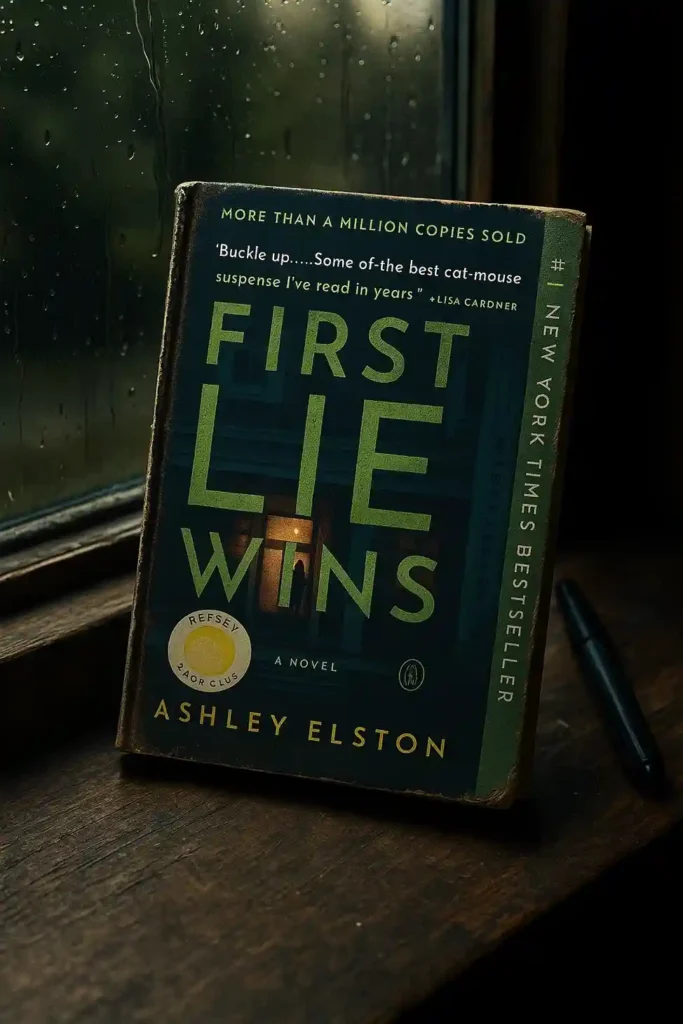I grabbed First Lie Wins at Barnes & Noble during my lunch break, thinking I’d read a chapter before my afternoon meeting. Three missed calls from my boss later, I sat locked in my office bathroom at 4:47 PM, hands shaking as I turned page 127. Ashley Elston had just shattered every assumption I had about Evie Porter’s identity, and I felt like someone had punched me in the chest.
I’ve demolished over 3,000 psychological thrillers in twenty years of reviewing for Dionysus Reviews, but this book grabbed my throat and wouldn’t let go. The rain hammered my office window as I read, matching the storm brewing in my head. Elston’s transition from YA to adult fiction proves she possesses serious literary talent that most authors spend decades trying to develop.
First Lie Wins delivers brutal psychological warfare disguised as a con artist romance. Evie Porter’s fabricated existence mirrors the lies we tell ourselves daily, making her deception feel uncomfortably familiar. I finished this book at 2:33 AM, immediately texted my sister about trust and identity, then lay awake questioning which parts of my own life might be carefully constructed performances.
Key Takeaways
Living multiple identities creates psychological fractures that make authentic relationships nearly impossible to sustain or trust.
Survival mechanisms developed in childhood become prisons that prevent genuine connection even when safety finally arrives.
Love can bloom within deception, but it requires brutal honesty and vulnerability to transform from manipulation into authentic intimacy.
The people who save us often become the ones who control us, creating complex power dynamics that blur the line between protection and captivity.
Truth becomes fluid when your entire existence depends on becoming someone new, making every relationship a careful calculation of risk versus reward.
Basic Book Details
Publishing Information: January 2, 2024 by Pamela Dorman Books/Viking
Genre: Psychological Thriller, Adult Contemporary Fiction, Suspense
Plot: Professional con artist Evie Porter infiltrates small-town Louisiana under false identity, but her latest assignment collides with dangerous past secrets that threaten everything she’s built
Series Information: Standalone novel
Page Count: 336 pages
Main Characters:
Evie Porter: Master of reinvention working for mysterious Mr. Smith, desperately seeking authentic connection while living fabricated identities
Ryan Sumner: Evie’s mark who becomes her emotional anchor, representing everything genuine she’s been denied
Lucca Marino: Ruthless operative from Evie’s past who knows her real name and uses psychological torture as his weapon
Mr. Smith: Puppet master who rescued teenage Evie then transformed her into his most valuable asset through calculated manipulation
Plot Synopsis And Character Foundations
Evie Porter’s Fabricated Identity And Mission Parameters
Evie Porter exists only on paper and in Ryan Sumner’s heart. I discovered this truth alongside her as she navigates her most dangerous assignment yet. Working for the shadowy Mr. Smith, she specializes in long-term psychological manipulation that requires complete personality reconstruction.
Her current job involves infiltrating Ryan’s life in rural Louisiana. But this assignment feels different from the moment she arrives. I found myself completely absorbed by Elston’s portrayal of someone who has forgotten which emotions are real and which are performance.
The complexity of maintaining multiple false identities creates fascinating psychological depth. Evie’s struggle to remember which version of herself Ryan fell in love with becomes the emotional foundation that drives every scene forward.
The Dual Timeline Structure And Flashback Revelations
Elston alternates between Evie’s current mission and her teenage origins with Mr. Smith. I appreciated how the flashbacks reveal her transformation from desperate runaway to polished operative without feeling like exposition. The author uses this structure to slowly build sympathy for a character whose current actions might otherwise seem unforgivable.
The past timeline shows how Mr. Smith recruited broken teenagers and molded them into perfect psychological weapons. Each flashback adds another layer to the mystery of Evie’s true identity and motivations.
When both timelines converge in the final act, the revelations recontextualize everything you thought you understood about loyalty, love, and the price of survival.
Psychological Thriller Elements And Narrative Craft
Cat-And-Mouse Dynamics Between Protagonist And Antagonist
Lucca Marino’s arrival transforms the story from romantic suspense into psychological warfare. I felt my pulse quicken every time he appeared on the page. He represents everything dangerous about Evie’s world because he knows her real name, her deepest fears, and exactly how to weaponize her past trauma.
Their confrontations crackle with lethal tension. Both characters are masters of psychological manipulation trying to destroy each other while maintaining perfect facades. I found myself reading their dialogue multiple times, searching for hidden threats and double meanings.
The chess match between these two kept me awake until dawn. Elston writes their interactions with surgical precision that makes every conversation feel loaded with potential violence and buried history.
Identity Deception Themes And Moral Ambiguity Analysis
The book explores identity in ways that go far beyond simple disguises. Evie’s different personas reveal fragments of her authentic self, raising questions about which version represents her true personality. This creates genuine moral complexity that I wrestled with throughout my reading.
Elston refuses to make her protagonist completely sympathetic. Evie commits crimes, lies to people she genuinely cares about, and manipulates innocent victims for money. Yet her vulnerability and desperate hunger for real connection make her compelling rather than reprehensible.
The moral ambiguity extends to every major character. Ryan harbors his own secrets, Mr. Smith genuinely believes he’s protecting his operatives, and even Lucca has understandable motivations for his cruelty. This nuanced approach elevates the material above typical thriller expectations.
Character Development And Relationship Dynamics
Evie Porter Versus Lucca Marino Character Study
Evie and Lucca function as dark mirrors of each other. Both survived Mr. Smith’s recruitment and training, but they chose completely different paths to psychological survival. Where Evie seeks connection despite her circumstances, Lucca embraces isolation and cruelty as tools of power.
Their shared trauma creates intimate knowledge that makes their conflict deeply personal. Lucca knows exactly how to hurt Evie because he understands her psychological wounds from the inside. This dynamic generates authentic tension that goes beyond simple antagonism.
The contrast between their character arcs highlights the theme of choice versus circumstance. Both faced similar childhood traumas, but their responses shaped them into opposing forces with completely different values and survival strategies.
Ryan Sumner’s Complexity And Mr. Smith’s Psychological Control
Ryan emerges as more than Evie’s latest mark. He becomes the catalyst for her emotional awakening and the first person to see through her performances to something genuine underneath. Their romance develops organically despite its deceptive foundation.
I was particularly impressed by how Elston avoids making Ryan a passive victim. He has agency, secrets, and complexity that make him worthy of Evie’s growing feelings. Their relationship becomes a study in how love can emerge even within carefully constructed lies.
Mr. Smith operates as a puppet master who maintains control through psychological manipulation rather than physical force. His hold over Evie stems from their shared history and his role as both savior and captor in her origin story.

Writing Style And Atmospheric Setting Analysis
Ashley Elston’s Transition From YA To Adult Fiction
Elston’s background writing young adult fiction serves her well in this adult debut. Her experience creating accessible prose that never talks down to readers translates perfectly to adult psychological themes. The transition shows in her sophisticated handling of moral compromise, psychological manipulation, and complex romantic relationships.
I noticed how she maintains the character focus and pacing that made her YA work successful while adding layers of complexity that adult readers demand. The writing feels confident and polished throughout, never tentative or uncertain about its darker themes.
Her ability to write teenagers authentically in the flashback sequences demonstrates how her YA experience enriches rather than limits her adult storytelling capabilities.
Southern Gothic Atmosphere And Cultural Authenticity
Elston’s Louisiana residence gives her authentic insight into the Southern setting that permeates every scene. The humid, oppressive climate mirrors the psychological tension between characters, while the Gothic elements of decaying mansions and family secrets support the story’s exploration of hidden truth.
I could smell the magnolias and feel the sticky heat as I read Evie’s scenes in rural Louisiana. The regional details never feel researched or artificial because they’re woven naturally into character interactions and plot developments.
The Gothic atmosphere reinforces themes of beautiful facades concealing ugly realities. The setting becomes integral to mood and meaning rather than just exotic backdrop for generic thriller elements.
| Element | Strength | Weakness |
|---|---|---|
| Character Complexity | Morally ambiguous protagonist with believable psychology | Some supporting characters lack depth |
| Plot Structure | Dual timeline creates effective suspense and revelation | Occasional confusion about chronology |
| Emotional Authenticity | Genuine relationships despite deceptive premise | Romance development feels slightly rushed |
| Writing Quality | Clean, engaging prose with strong dialogue | Certain plot logistics strain credibility |
| Atmospheric Setting | Rich Southern Gothic mood that supports themes | Resolution ties up loose ends too neatly |
Pros
The characterization stands out as the book’s greatest achievement. Evie Porter ranks among the most compelling unreliable narrators I’ve encountered in recent thriller fiction. Her moral complexity makes every decision feel consequential and emotionally charged.
Elston’s plot construction demonstrates masterful thriller writing. The reveals feel earned rather than manipulative, and the pacing builds tension steadily without relying on cheap cliffhangers. Each twist recontextualizes previous events in satisfying ways that reward careful readers.
The psychological depth sets this apart from typical con artist stories. Rather than focusing solely on elaborate schemes, Elston explores the emotional cost of living false identities. The book asks meaningful questions about authenticity, trust, and the possibility of redemption.
The dual timeline structure works brilliantly to build both suspense and sympathy. The flashbacks provide context for Evie’s current psychology without feeling like exposition dumps or pacing interruptions.
The Southern Gothic atmosphere adds richness without becoming stereotypical. Elston uses the Louisiana backdrop to reinforce themes and mood rather than just providing exotic flavor for generic thriller elements.
Cons
Certain plot elements strain credibility, particularly regarding Mr. Smith’s operation and resources. The logistics of running multiple long-term cons with such precision feels implausible even within the book’s heightened reality.
The romance subplot, despite its emotional effectiveness, relies on some familiar tropes about love conquering deception. The relationship development between Evie and Ryan occasionally feels rushed given her psychological barriers and the circumstances of their meeting.
Some secondary characters lack the depth and complexity of the main players. Certain figures in both timelines feel more like plot devices than fully realized people with their own agency and motivations.
The conclusion resolves conflicts perhaps too neatly for a story built on moral ambiguity. The ending provides satisfaction but loses some of the psychological complexity that made the journey compelling.
The dual timeline occasionally creates confusion about character relationships and chronology. Some flashback sequences interrupt present-day tension in ways that slow momentum rather than building suspense.
Final Verdict
First Lie Wins succeeds as both entertaining thriller and thoughtful exploration of identity and connection. Ashley Elston proves her versatility by crafting an adult debut that feels confident and fully realized rather than tentative or derivative.
I closed this book at 2:33 AM with my heart racing and my mind spinning with questions about truth, deception, and the stories we tell ourselves. Elston creates a protagonist whose moral complexity makes her both sympathetic and troubling, forcing readers to examine their own capacity for self-deception.
The book delivers everything genre fans expect while adding emotional depth that lingers long after the final page. Evie Porter joins the ranks of memorable protagonists who make questionable choices for understandable reasons, creating the kind of moral ambiguity that makes great psychological fiction.
Despite minor flaws in pacing and credibility, the novel provides a deeply satisfying reading experience. Elston’s transition from YA to adult fiction feels natural and suggests promising future work in psychological suspense.
I recommend First Lie Wins to readers who appreciate character-driven thrillers with psychological complexity. Fans of Gillian Flynn and Tana French will find similar attention to character psychology and moral ambiguity that rewards careful analysis.
For those seeking pure action or procedural elements, this book may feel too introspective and relationship-focused. But readers who enjoy exploring the psychological motivations behind criminal behavior will find plenty to appreciate in Elston’s nuanced approach.
Dionysus Reviews Rating: 7/10
First Lie Wins demonstrates that the best psychological thrillers combine pulse-pounding suspense with genuine emotional stakes. Ashley Elston has announced herself as a significant new voice in adult psychological fiction with this memorable debut.
Sip The Unknown—Discover Stories You Never Knew You’d Love!
Dionysus Reviews Has A Book For Every Mood
Biography & Memoir
Fiction
Mystery & Detective
Nonfiction
Philosophy
Psychology
Romance
Science Fiction & Fantasy
Teens & Young Adult
Thriller & Suspense
Frequently Asked Questions
Does Ashley Elston’s YA background limit or enhance her adult thriller writing in First Lie Wins?
Elston’s young adult experience actually strengthens her adult debut significantly. Her YA background brings clarity and accessibility to complex psychological themes without dumbing them down.
I noticed how she maintains the character focus and emotional authenticity that made her YA work successful while adding sophisticated layers of moral ambiguity that adult readers crave. The teenage flashback sequences feel particularly authentic because she understands how to write adolescent psychology convincingly.
Rather than limiting her, the YA foundation gives her storytelling a solid emotional core that many adult thriller authors struggle to achieve.
How does Evie Porter’s unreliable narration compare to other psychological thriller protagonists like Gone Girl’s Amy Dunne?
Evie differs from Amy Dunne in crucial ways that make her more sympathetic despite her criminal activities. Where Amy’s deception stems from narcissism and calculated malice, Evie’s lies serve survival and self-protection.
Her unreliability comes from trauma response rather than personality disorder, which creates empathy even when readers disagree with her choices. I found myself rooting for Evie despite her crimes because her motivations feel understandable and human.
Unlike Amy’s cold manipulation, Evie genuinely seeks connection and struggles with the emotional cost of her deceptions, making her psychology more complex and relatable.
What makes the dual timeline structure work effectively in this particular story?
The dual timeline succeeds because both timeframes build toward the same emotional revelation about identity and belonging. Rather than using flashbacks as simple backstory, Elston crafts two parallel narratives that illuminate different aspects of Evie’s character development.
The past timeline shows her transformation from vulnerable teenager to skilled operative, while the present timeline shows her attempting to reclaim her humanity.
I appreciated how the structure creates sympathy for current Evie by revealing the trauma that shaped her choices. The timelines converge perfectly in the climax, making both threads feel necessary rather than one overshadowing the other.
How authentic are the con artist operations and psychological manipulation techniques depicted?
The psychological aspects feel completely believable, even if the operational logistics stretch credibility. Elston nails the emotional manipulation tactics that real con artists use: building trust, creating dependency, exploiting vulnerabilities, and maintaining control through intermittent reinforcement.
Mr. Smith’s recruitment of damaged teenagers and his methods of psychological control ring true to documented cases of manipulation and grooming. The long-term identity construction feels less realistic given practical constraints, but the emotional truth of how these operations damage their participants comes through powerfully. I was more convinced by the psychological damage than the technical execution.
What role does the Louisiana Gothic setting play beyond atmospheric decoration?
The Louisiana setting functions as more than backdrop; it becomes integral to the story’s themes about hidden truth and beautiful facades. The oppressive humidity mirrors the psychological pressure Evie feels maintaining her false identity, while the decaying mansions and family secrets reflect the Gothic tradition of corruption beneath genteel surfaces.
I noticed how Elston uses regional social dynamics to explore themes of belonging and authenticity. The small-town setting where everyone knows everyone’s business creates additional tension for someone living a lie.
The Gothic atmosphere reinforces the book’s exploration of moral ambiguity and the psychological cost of deception, making the setting feel organic to the story’s emotional landscape.









